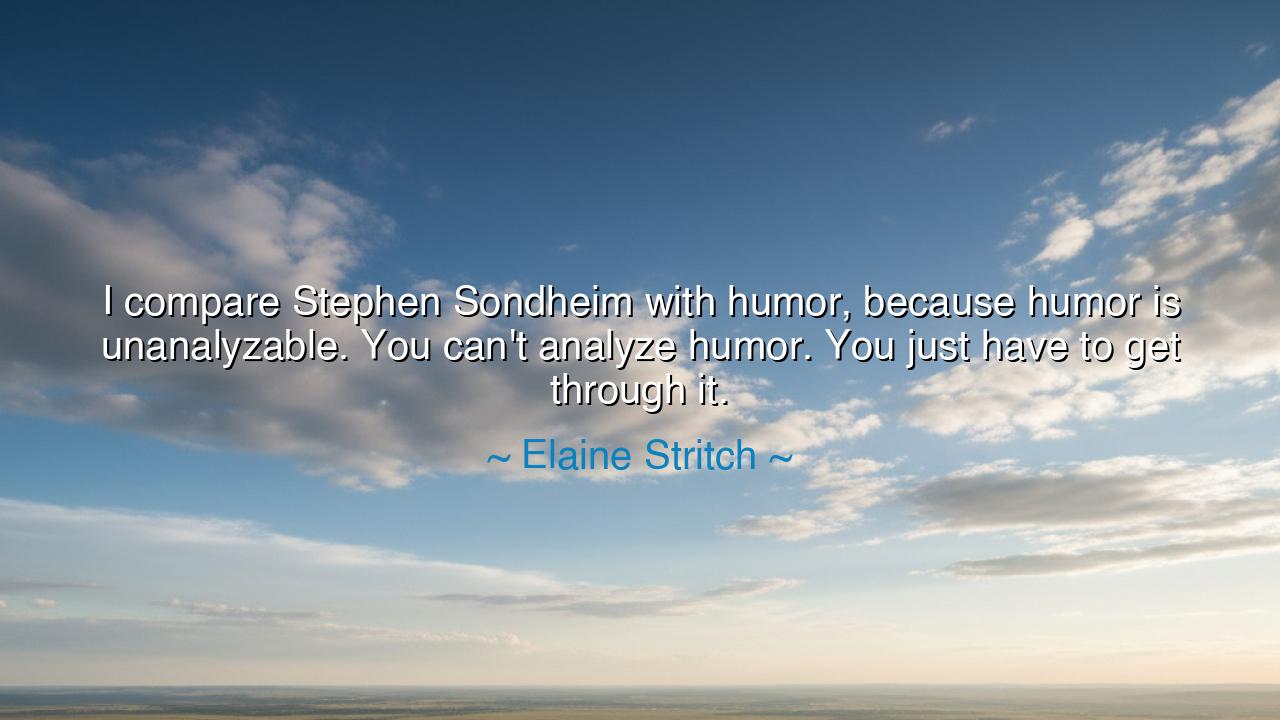
I compare Stephen Sondheim with humor, because humor is
I compare Stephen Sondheim with humor, because humor is unanalyzable. You can't analyze humor. You just have to get through it.






In the words of Elaine Stritch, “I compare Stephen Sondheim with humor, because humor is unanalyzable. You can't analyze humor. You just have to get through it.” Though wrapped in her trademark wit, these words contain the quiet fire of artistic truth. For Stritch, who spent her life upon the stage, speaking the words and singing the songs of Sondheim, this statement was not merely about laughter or melody — it was about the mystery of genius, the unspoken alchemy of feeling that defies dissection. In comparing Stephen Sondheim to humor, she reveals that both are living forces — unpredictable, elusive, and divine. They cannot be caught by the net of reason; they must be lived, felt, and endured.
To say that humor is unanalyzable is to confess that some of life’s deepest truths resist explanation. Like love, or grief, or the sudden ache of beauty, humor arises from the strange collision between chaos and understanding. It is the laughter that escapes the heart before the mind can measure it. So too is Sondheim’s music: intricate, intellectual, yes — but beneath the architecture lies something uncontainable, something that stirs the spirit without logic. Stritch, who sang his words with both reverence and defiance, knew that his songs were not puzzles to be solved, but storms to be weathered. To perform Sondheim, as she once said, is not to understand him, but to survive him.
In ancient times, the philosophers sought to explain joy as they did the stars. But the poet Aristophanes, that master of laughter, defied them. He knew that comedy — like the divine itself — loses power when dissected. “Laughter,” he might have said, “belongs to the living.” It cannot be captured in theory, for its spark lies in surprise. Likewise, Sondheim’s art, with its shifting tones and emotional paradoxes, resists formula. His songs mirror the contradictions of the soul — hope entwined with despair, irony cradling sincerity. And Elaine Stritch, that grand priestess of performance, understood that to serve such art, one must abandon the safety of analysis and surrender to the truth of experience.
Her words — “You just have to get through it” — carry the weariness and wonder of one who has faced the mountain of art and emerged scarred but shining. For to “get through” humor, or Sondheim, is to pass through the fire of emotion, to be both broken and remade by what one performs or perceives. It is not the laughter of ease, but the laughter that saves us — the kind that comes after tears, after struggle, after confronting the absurdity of being alive. In this, Stritch’s wisdom is not limited to the stage; it belongs to all who have lived deeply, who have learned that life itself, like art, cannot be analyzed — it must be endured, embraced, and expressed.
Consider the tale of Beethoven, who, deaf and tormented, wrote symphonies that defied comprehension. Critics sought to explain his genius with formulas of harmony and rhythm, but they failed, for what he created was not mechanical perfection, but spiritual revelation. The same is true of Sondheim’s work, and of humor itself — both spring from a place beyond intellect, where emotion becomes sound and irony becomes survival. Elaine Stritch, who sang “The Ladies Who Lunch” not as a performance but as a confession, understood that art’s power lies not in clarity, but in raw truth.
And so, her comparison becomes a lesson: not all things meant to move us can be understood. The desire to analyze humor or art is the mind’s attempt to cage what the heart must experience freely. True laughter cannot be planned; it bursts forth from recognition. True art cannot be reduced; it demands surrender. The wise, therefore, do not seek to master every mystery. They let the wave pass through them. They feel deeply, live fully, and let meaning arise as it will.
Let this be the teaching: do not seek to understand all beauty — live it. When faced with something vast — a song that breaks you, a joke that heals you, a grief that remakes you — do not demand answers. Feel it, move through it, and trust that the meaning lies not in your comprehension, but in your experience. For the soul, like the stage, does not require explanation to be true.
And so, dear listener, remember the words of Elaine Stritch: “You just have to get through it.” Whether in art, in laughter, or in life, wisdom does not come from analysis but from endurance — from daring to live the unexplainable with courage and wit. For when we stop trying to understand everything, we begin, at last, to feel it — and that, perhaps, is the truest understanding of all.






AAdministratorAdministrator
Welcome, honored guests. Please leave a comment, we will respond soon